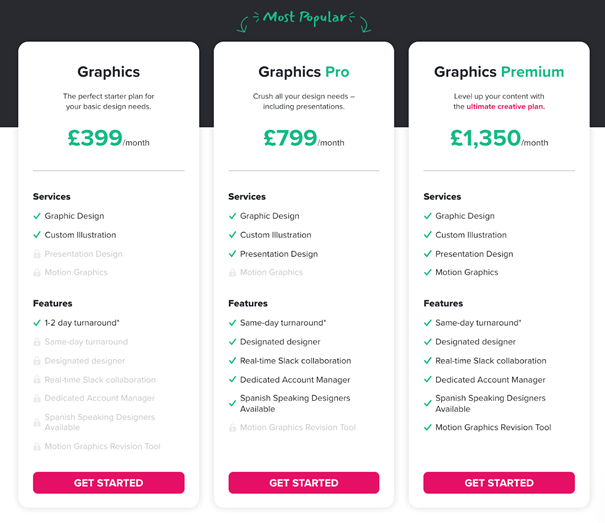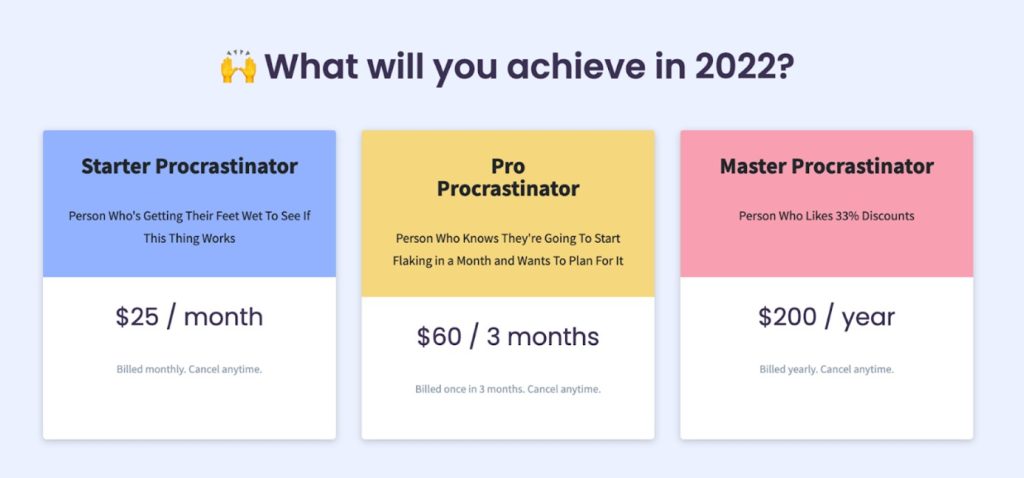Freelance consultants and consulting firms have trouble scaling. It’s hard to grow a professional services business without growing the headcount, and it can be a challenge to automate chunks of such a high-touch profession.
So unlike blitzscaling companies in the worlds of SaaS and ecommerce, consultants find themselves selling hours for dollars. More growth just means more work. This is time they could be spending finding ways to scale the business, generating more high-value leads, or investing in networking and marketing.
The unexpected solution to all of this? Productizing your services.

What are productized services?
Productized services are the services you’re already offering, just bundled into standardized packages. Your offering is as specific as the feature list on a physical good you’d buy online, instead of the usual practice in consulting where you get on a call and diagnose problems as you go. For the customer, it means they know exactly what they’re paying for.
But for freelancers and small companies, there are many benefits to productizing their services. These include boosting revenue, optimizing your sales pitch, and streamlining your operations.
Benefits of productizing your services
Boost your sales
Productizing your services will allow you to boost your sales, increasing revenue outright. By standardizing your offering you’re also standardizing your sales process. This enables you to monitor and A/B test your sales pipeline as any ecommerce retailer does.
Ecommerce retailers are very closely monitoring objective measures like page drop-offs and their abandoned digital cart rate. On the other hand, most sales teams in professional services are having to come up with new lines of attack for every new prospect.
Streamline your marketing processes
Every company has set processes, whether by design or force of habit. While you might pride yourself on the personal touch your attentive sales team provides, there are inevitably processes for things like lead generation or winning contracts.
Productizing your services enables you to streamline those processes, partly by reducing the amount of communication needed. You’re removing the need for intro calls by offering a specific package upfront. And as you improve your site, you could reduce the sales and follow-up process to a couple of meetings and some client care emails.
After all, ecommerce personalization is only made possible by the kind of data made available to retailers by operating at scale. By gathering ecommerce-style data on your processes you’re able to streamline and simplify until your team is getting it right every time.
Enhance your team’s productivity
For professional services agencies like management consultancies, this kind of standardization can be transformational. Not only do productized services open the door for packages like subscription services, a source of recurring revenue we’ll explore later, they can enable a much calmer and more productive way of working.

By running the same process for every client, you make life in the office much more stable and predictable. No longer are your team putting out unforeseen fires, hopping between projects, and context-switching around completely different tasks. To a much greater extent, your team can collaborate on projects without much onboarding.
Scale your business more easily
There’s an analogy between logistics and warehousing. Why is inventory management important for wholesale retailers? In part, it’s because a huge amount of efficiency is gained by “chunking” simple tasks or processes.
The same product is sold in the same amount every time, often bundled in the same deals, because standardization unlocks economies of scale from the forklift driver who has to make fewer trips to the hauler fitting more uniform packages into the lorry.
This may seem a world away from consulting. But when you productize services you want to leverage the kind of scalability other industries have been running on for decades. To make this management more attainable, integrate warehouse management systems into the processes.
Get more time to strategize
By putting data at your disposal and letting you A/B test everything, productizing your services might be one of the best ways to learn about them in detail. With ecommerce thinking and multichannel order management, you’re able to refine your value propositions for different clients much faster than you could with bespoke, apples-and-oranges consulting projects that couldn’t be meaningfully compared.
For consultants who are working freelance or running small agencies, all this frees up time you’re spending putting out fires. This could free up time to work on more strategic projects that will help grow the business, not just keep the lights on, or give yourself a well-earned rest once in a while.
Establish loyalty in your customers
You’re not the only one benefitting. For clients, your productized services offer well-tailored packages that you’ve carefully optimized to solve specific problems. Unlike with freelance or contract workers, there’s little risk of your fixed-cost projects overrunning.
If you’re looking for B2B software like HR automation or the best ERP for retail, you want to know what you’re getting and exactly what you’re paying for it. Productized service packages give you a competitive edge because you’re offering your clients a well-defined, high-value product at a predictable cost they can justify to themselves and the company, eventually establishing loyalty.
Examples of productized services
In the world of graphic design, designers and studios like Design Pickle are productizing with subscription services. Rather than paying for freelance work on a per-job basis, whenever the designer is free, companies can pay a daily subscription fee to have a designer on call for a few hours a day.
This means studios can charge a competitive price in exchange for the safety of recurring revenue, and companies can outsource work quickly and cheaply with little coordination upfront.
Productized services are the secret behind the best payments software, automation software, and best retail management software companies. In the SaaS model, unlimited digital resources can be provided to customers as easily as it is to turn on a tap. It would cost almost nothing for these companies to provide extra seats, more email addresses, etc.
But productized service packages are a natural fit for this business because bespoke packages allow companies to charge what customers are happy to pay. At the same time, the customer feels like they’re getting a good deal because they feel like they’re only paying for the package they need.
In the professional services sector, we’re already seeing companies such as Copyhackers, Ethercycle, and Boss as a Service offering productized packages and pricing tiers for their services. Ethercycle offers a flat rate for redesigning and refining their clients’ Shopify sites, and Boss as a Service helps freelancers with productivity and accountability with packages at $25, $60, and $200 price points.

How to leverage productized services
To productize your services, the first step you’re going to have to take is making your offering extremely specific. Maybe this just means listing the deliverables you tend to give to clients. Maybe you’ll have to identify a niche and pivot your offering towards that. You can iterate and change everything as you go, so it’s not as daunting as it might sound.
But marketing is all about appealing to the niche audience, so you’re going to have to stand out from the crowd by offering very specific service packages and going after the people who need them.
Choose your format
With a productized service, you can spin off your knowledge and skills into any number of formats. Look into online courses, one-on-one video calls, ebooks, and paywalled newsletters and see what could be a natural fit for your company.
With plenty of adaptive content ecommerce opportunities like copy personalized to sectors and hyper-personalized email marketing, you don’t need to worry about losing the personal touch your clients value so much.
Structure your offering
What’s the structure of your new offering? Are you going to offer only one package, or are you going to do it like a SaaS company and offer different tiers of service? Is this a one-time engagement or do you want to go after the “rundle”?
Refine
Whatever you decide now, it’s not set in stone. Silicon Valley is so obsessed with shipping the “minimum viable product” because it enables them to start testing and iterating as soon as possible. You can take as long as you need to start small, soft-launch your productized service alongside your usual client work, and test things out before you commit.
Demonstrate expertise
By demonstrating expertise and proven results in your chosen niche, you’ll be able to win business more easily than ever before.
We’ve covered how productizing your services enables you to examine and learn from your processes with the kind of analytics that ecommerce companies enjoy. One aspect of that is that you can see exactly how much benefit different clients get from each of your products.
This is good data to learn from, but this can function as social proof which is a great marketing asset. Collect quantitative and written feedback from your clients using surveys to build out testimonials and case studies. At least one case study per product, backed up with statistics that speak for themselves, will be a huge benefit to your website’s sales funnel.
Substantial case studies can also be easily broken up into key points and infographics for your social media channels, making productizing your services a great way to clarify your marketing messages and deliver them at scale
The end result of productizing your services
By productizing their services, businesses find they’re running a more predictable operation day-to-day. This means that time and resources can be allocated more accurately, but more importantly, it’s a step towards decoupling your time from the growth of the company.
More predictable, lucrative work using processes you’ve refined to perfection means you and your team have more room to breathe. A happier, more autonomous, more profitable working life can be achieved just by standardizing and productizing services as companies in SaaS and ecommerce have done for years.


